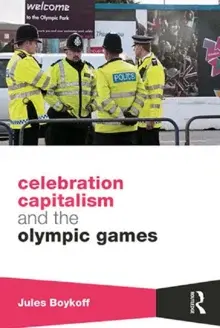The best books about the Olympics that the IOC doesn’t want you to know
- Urban Youth Research

- Jul 1, 2023
- 3 min read

By Jacqueline Kennelly
Who am I?
I wasn’t really interested in the Olympics until they came knocking at my door. I lived in Vancouver during the 2010 Winter Olympics Bid. When a plebiscite was called, the Yes side plastered the city with billboards explaining why everyone should want the Olympics. Simultaneously, a much less resourced but vocal opposition argued that hosting would be an environmental, social, and economic disaster. The two sides were so far apart that my curiosity was piqued. When I began a postdoctoral fellowship in the UK, I realized that they, too, were in the midst of similar debates, as hosts of the 2012 Summer Olympics. From here a research project was born.
I wrote…
Olympic Exclusions: Youth, Poverty and Social Legacies
What is my book about?

Olympic Games are sold to host city populations on the basis of legacy commitments that incorporate aid for the young and the poor. Yet little is known about the realities of marginalized young people living in host cities. Do they benefit from social housing and employment opportunities? Or do they fall victim to increased policing and evaporating social assistance? This book answers these questions through an original ethnographic study of young people living in the shadow of Vancouver 2010 and London 2012.
The books I picked & why

By Jules Boykoff
Why this book?
Jules Boykoff has been writing about the Olympics for a very long time.
His work is smart, readable, well researched, and grounded in reality. He also happens to have been an Olympic soccer player. So he’s got credibility as a guy who values sports, yet still thinks the Olympics have a lot to answer for.
Celebration Capitalism is the book where Jules lays out his theory of how the Olympics, and other mega-sporting events, capitalize on sports celebrations to further enrich the rich, and impoverish the poor.
He builds on Naomi Klein’s concept of ‘disaster capitalism’ to make this argument, and in my opinion, it’s bang on.
By Andrew Zimbalist

Why this book?
Olympics organizers love to produce economic impact assessments claiming that hosting this mega-event will boost the local economy by astronomical amounts.
Andrew Zimbalist is an economist who painstakingly illustrates why this is never the case. Circus Maximus is written for a lay audience, rather than an academic one, and is easily read even by us non-economists.
He clearly and methodically demonstrates how and why the Olympics and World Cup have never made money for their host cities, and likely never will.
By John Horne, Garry Whannel

Why this book?
If you want a broader overview of where the modern Olympics came from, why they have persisted, and what major issues they continue to face, look no further than Understanding the Olympics by John Horne and Garry Whannel.
This book is now in its third edition, and with each update, Horne and Whannel keep the book on top of the most recent Olympics shenanigans. Although not exclusively critical of the Games, Horne and Whannel provide a thorough overview of the pros and cons of these massive mobile mega-events.
By Helen Jefferson Lenskyj

Why this book?
This is the grand-mere of contemporary critical Olympic literature.
Helen Lenskyj was one of the first scholars to draw attention to the problematics of the Games, including human rights abuses, displacement of homeless populations, and elite scandals that ought to send law-abiding citizens running. It continues to be a powerful and relevant read for anyone interested in peeking behind the curtains of the Olympic behemoth.
By John Rennie Short

Why this book?
John R. Short is another scholar who has been blowing the whistle on the hidden costs of Olympic Games, especially for host cities, for many years.
In this recent release, written for a popular audience, he provides some history of the Games, but, more importantly, a step-by-step breakdown of why the Olympics costs cities much more than the IOC or bidding committees would like you to believe.
He also includes a thorough list of ‘further reading’ resources (and my book plus almost all of the authors on this list are on it!).
![CentreForUrbanYouthResearch_FINAL-[Recovered]_RedBadge_Logo.png](https://static.wixstatic.com/media/93b051_2c28e06e8dbf40abbe2286237c8218d2~mv2.png/v1/fill/w_703,h_80,al_c,q_85,usm_0.66_1.00_0.01,enc_avif,quality_auto/CentreForUrbanYouthResearch_FINAL-%5BRecovered%5D_RedBadge_Logo.png)



Comments